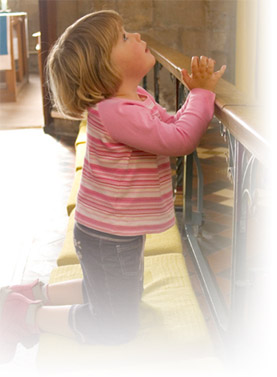Sunday Sermon for June 25, 2017, the Twelfth Sunday in Ordinary Time, Year A
Readings: Jer 20:10-13; Rom 5:12-15; Mt 10:26-33
In the second reading today St. Paul teaches us that in the sin of Adam, all sinned. While Original Sin is not a personal sin of ours, we are still conceived and born with this sin on our souls. It is removed through Baptism, but the effects of the sin remain in us. Over the course of our lifetime we have each added many sins on top of the one we inherited from Adam.
How each of has been affected by Original Sin varies in many ways. The darkening of the intellect and the weakening of the will affect us directly in our day to day lives. Combined with the environment in which we live, we are very much prone to temptation and sin. Our personality, the events that have occurred in our life, our companions, and the example of others are just a few of the variables that can influence us.
Two of sin’s effects are described in the first reading: fear and aggression. Some people live in fear of what might happen to them; so are aggressive, even violent toward others. As we hear from the Prophet Jeremiah, there were some people who were plotting against him, denouncing him and seeking vengeance against him. What did Jeremiah do to cause this kind of reaction? He spoke the Word of God which the people did not want to hear.
In the present world there are many people who live in fear because they feel vulnerable. Perhaps they are afraid that their belongings will be stolen, maybe they are afraid of a terrorist attack, or possibly past violations have left them anxious about the present. Whatever the circumstances, we have to look at what we are told in today’s readings.
Jeremiah says that he has entrusted his cause to the Lord; he sings praise to the Lord while knowing others are plotting against him. Jesus tells His disciples in the Gospel reading today not to fear anyone, except the One Who can destroy both body and soul in Gehenna. Moreover, St. Paul tells us that the grace of God and the gracious gift of Jesus Christ overflow for the many. In other words, the grace is available for us to overcome our weaknesses as well as our sinful tendencies.
Only God can destroy both body and soul in Gehenna, so the fear our Lord spoken of in this passage is filial fear rather than servile fear: fearing to offend God because we love Him rather than being afraid of God. So, if we love God that much, does that guarantee that nothing bad will happen to us? One look at the Cross with our Lady standing beneath it reveals that God allowed some very painful things to happen to those who love Him the most.
So, what should I do when I am seized with fear? Jesus told us to fear no one, but what if I am not able to do that presently? The best way to handle this is to call upon that grace of which St. Paul writes, stand against our own weakness, and try to praise God. This is what Jeremiah did; St. Paul and Silas did the same thing when they were flogged and put in prison. Their prayer and praise resulted in the conversion of the jailer and his entire household.
But what if God still allows bad things to happen? It may be that He is testing us. There is a story of a young woman who was praying her Rosary in her college dormitory when a serial killer entered her room. She kept praying and the man backed out of her room. There are other stories about those confronted with attackers who called upon the Name of Jesus, commanding the aggressors to leave in His Name. In these instances, the villains turned and left. We know that calling upon the Names of Jesus and Mary is very powerful when confronted with the evil one. How often do we call upon the Lord in times of trouble?
The lives of the Saints, and especially the Martyrs, might cause us to be tempted to look elsewhere. After all, if Jesus allows them to be treated so badly, why should I trust Him? We have to recall that He does not do things our way; we are to strive to do things His way. He brings good out of evil, so no matter what He is allowing, even if it is ostensibly evil, the Lord’s purpose in allowing it is to bring about some good. We need God’s grace to overcome both our fears and our aggressions. The readings today give us some practical and concrete direction that can help us in any circumstance in which we find ourselves: Trust, pray, and praise the Lord!
Fr. Altier’s column appears regularly in The Wanderer, a national Catholic weekly published in St. Paul, Minn. For information about subscribing to The Wanderer, please visit www.thewandererpress.com.

